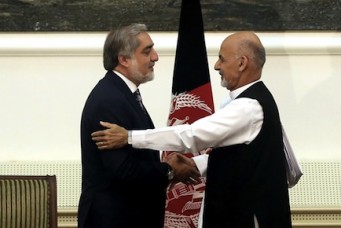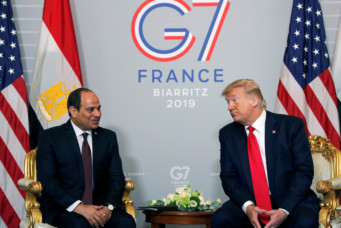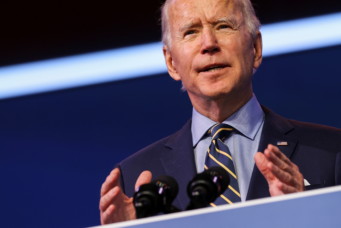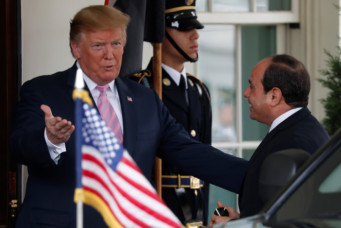False Assumptions and Ethical Shortcomings in Kabul
What happened in Kabul has taught us that countries must avoid over-relying on America, and Washington needs to better understand foreign theaters.

Taliban forces patrol in Kabul, Afghanistan, August 16, 2021. Reuters
There is an uncanny similarity between the events of Kabul this month and the United States’ departure from Saigon in 1975. Images of U.S. personnel and Vietnamese allies climbing a ladder to the top of the American embassy to catch military helicopters were strikingly similar to the videos of American planes taking off from Kabul airport with passengers clinging on its wings. Only the first took place in Vietnam half a century ago.
Those shocked by the U.S. departure from Afghanistan should not be, even while observing the lack of planning and chaos with which U.S. citizens were evacuated as well as the callous treatment that its Afghan allies encountered in the face of a dire future. Some ask why the United States left Afghanistan after spending more than $1 trillion in defense and losing thousands of its own soldiers there. And how was Washington able to reach an agreement with the Taliban, despite the fact that all what they represent as a political group and movement contradicts so sharply with the principles that the United States and the West claim to uphold.
The American decision to withdraw from Afghanistan comes with its increased pivot toward Asia and from confronting China as a rapidly rising political and economic power. This provides some context, but more definitive and pressing political considerations have shaped U.S. decisions and policies over the past decades, regardless of the partisan affiliation of the country’s president or the elected majority in Congress. These considerations have persisted, largely unchanged, since America’s emergence as a world power in the aftermath of World War II.
The first involves assessing the expected gains or losses in making any political decision. In essence, American foreign policy is guided by the same principles that underpin U.S. economic policy, which is calculating profits and risk and prioritizing markets over people. Yet others ask, how then has Washington abandoned all its investments in Afghanistan? The answer lies in the short cycle of elections embedded in its political system. The national presidential election recurs every four years, with term limits capped at eight years. In Congress, some elections occur at even closer time intervals, every two years. This is also the case in state elections.
The recurrent and frequent elections drive politicians to consider most issues and consequences of their decisions in the short term, discounting the events and decisions of the past. President Biden, a Democrat, decided to withdraw from Afghanistan in order not to accrue more material expenses or suffer more human losses. In doing so he was looking forward not encumbered by the decision to intervene in Afghanistan or not in the first place—a decision Republican President George W. Bush made years ago. Biden in short applied the material, economic logic of not wasting more money on a failed project, or as is said in market parlor “throwing good money after bad money”. With the potential of gaining profits in Afghanistan farfetched, his goal was simply to reduce future costs, which is precisely what the Republican president Gerald Ford did in Vietnam.
Needless to say, the chaos and disorder that accompanied the withdrawal process in Kabul has left a bad impression on the image of the United States and the performance of the current administration; both with respect to the hasty departure of American and foreign diplomats often without Afghan supporters, as well as the surrender of the country to the Taliban, some of whose leaders were once locked away in Guantanamo Bay. President Biden nevertheless came out to affirm with conviction that he stood “squarely behind” the decision to exit Afghanistan as a commitment to America’s interests. He clearly sensed how psychologically exhausted the American people are from the United States’ extended military confrontations in foreign counties, especially given the difficulty in justifying continued U.S. presence in Afghanistan in the absence of a direct threat or strategic partnership.
Biden also expressed that the United States would prevail over the short-term tarnishing of its image and that the international community will not be able to shun or dispense with America. Former Secretary of State Madeleine Albright also once described her country as indispensable. Noteworthy as well however are Henry Kissinger’s assertions that recent events clearly illustrate that U.S. power, wealth, and endurance has its limits, and that its mistakes are highly costly and consequential.
There is no doubt about the power and wealth of the United States, and this fact will make many countries continue to seek close ties with Washington despite recent Afghanistan developments. And there have been and will continue to be benefits for many countries in having constructive relations with America. However, America’s actions and priorities have always been and will continue to be its short-term national interests and material gains of today and tomorrow.
The more important question that should be asked, and which surprisingly is not being posited, is why American friends and allies continue to have unrealistic expectations about the United States. We should rather question the consistency of American positions—their limitations and costs and benefits—in order to optimally manage our reactions in light of the irrationality of being over-dependent on the United States.
In all candidness, if choices have to be made, America will not hesitate to make decisions at the expense of even friends and allies. Therefore, while cooperation with America is necessary, exaggerated reliance on it is a grave mistake. I believe for most countries, national and regional engagement is the best path forward in the medium and long terms; countries can share capabilities and ambitions and engage with each other in ways that directly respond to their realities on the ground.
Moreover, after the invasion of Iraq and Afghanistan, and other costly and unsuccessful military entanglements, the United States should finally appreciate that great-power conflict in a strategic paradigm is one thing, and that addressing local and regional issues as well as altering the social composition of other countries is another thing entirely.
The United States must also learn from its mistakes, especially with regards to delusions of power and arrogance associated with material abundance. It must understand the national and regional theaters of the countries it wishes to involve itself with before entangling itself in foreign conflicts and reckless military ventures that will lead to great loss and devastation. The United States must also examine and appraise the multi-faceted means available to achieve its goals in different situations. To prevail in a military campaign does not necessarily mean victory in war; nor does military action resolve every issue or achieve every objective. In most cases, force is not the best option especially given many other available incentives that are mutually beneficial to all involved parties, particularly if the United States is truly promoting and cultivating a centrist stable global community.
Nabil Fahmy is a former foreign minister of Egypt. He is also Dean Emeritus and Founding Dean of the School of Global Affairs and Public Policy at the American University in Cairo. He served as Egypt’s ambassador to the United States from 1999 to 2008, and as envoy to Japan between 1997 and 1999. On Twitter: @DeanNabilFahmy.
Read More




